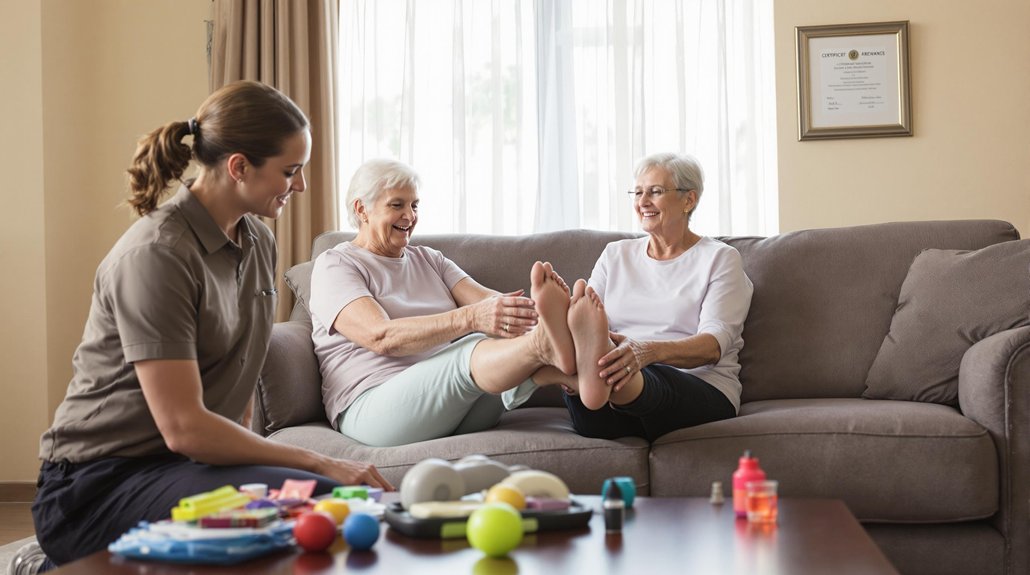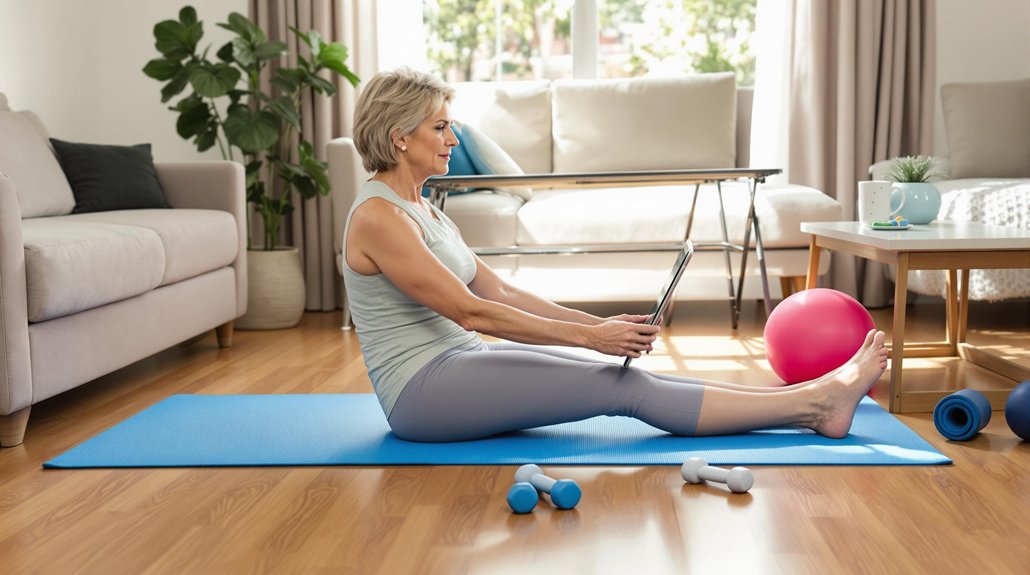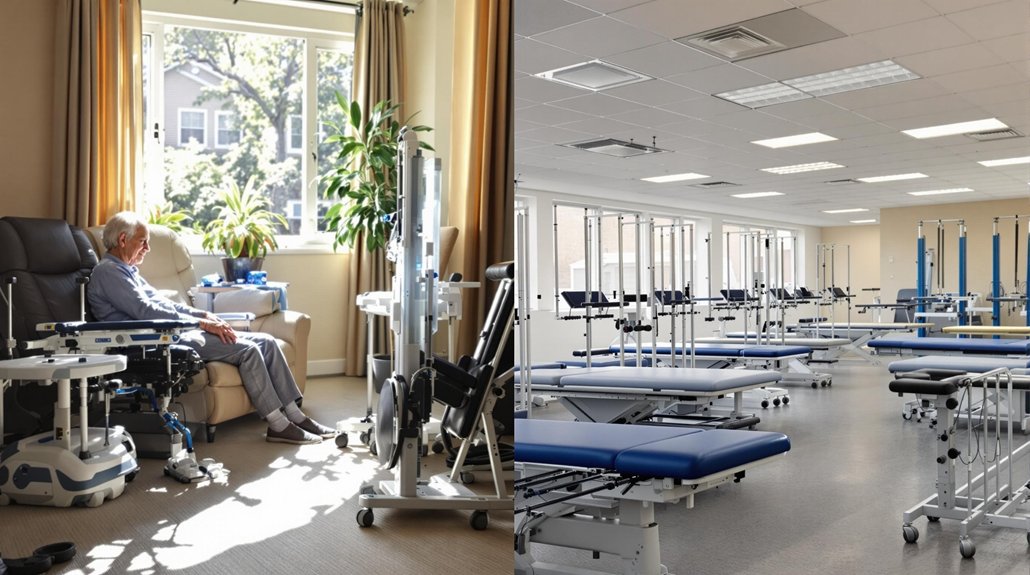Your in-home physical therapy sessions will typically last 45-60 minutes, though your first visit may take up to 75 minutes for a complete evaluation. You’ll usually receive treatment 2-3 times per week, with session length adjusting based on your condition and progress. While Medicare guidelines require minimum treatment times, your therapist will prioritize quality care over strict scheduling. Understanding what affects your session duration can help you make the most of your therapy experience.
Typical Duration of In-Home Physical Therapy Visits
While every patient’s needs differ, in-home physical therapy sessions typically last 45-60 minutes. Your therapist will structure this session length to maximize your treatment benefits while ensuring you don’t become overly fatigued.
The first visit often runs slightly longer, usually 60-75 minutes, as it includes a thorough evaluation of your condition and living environment.
Initial physical therapy evaluations require extra time to properly assess both patient condition and home setup needs.
Therapy frequency usually starts at 2-3 visits per week, though this can vary based on your diagnosis, recovery goals, and insurance coverage.
As you progress, your therapist may adjust both the session length and visit frequency. Some patients require shorter, more frequent sessions, while others benefit from longer, less frequent visits.
Your therapist will continuously evaluate your progress to determine the most effective duration for your specific needs.
Licensed physical therapists develop customized treatment plans tailored to each patient’s recovery needs.
Factors That Influence Session Length
Several key factors determine the length of your in-home physical therapy sessions. Your therapist will adjust session flexibility based on your specific condition, recovery goals, and overall progress. Insurance coverage often influences allocated time, while your energy levels and tolerance for exercise play vital roles in session duration.
| Factor | Impact on Session Length |
|---|---|
| Complexity | More complex conditions need longer sessions |
| Stamina | Patient endurance affects exercise duration |
| Goals | Treatment objectives determine time needed |
| Equipment | Setup and breakdown time varies by tools used |
| Location | Travel and setup logistics affect timing |
Your therapist will continuously assess patient needs and modify session length accordingly. Factors like medication timing, caregiver availability, and your daily routine can also impact how long each visit lasts. Remember that quality of treatment matters more than strict time adherence. Medicare-approved services through Focus Family Care ensure comprehensive physical therapy support for eligible seniors at home.
First Visit vs. Follow-Up Session Times
Because initial physical therapy evaluations require thorough assessments, your first in-home session typically lasts 60-90 minutes compared to 45-60 minutes for follow-up visits.
During this extended initial assessment, you’ll gather detailed information about your patient’s medical history, perform extensive physical examinations, and establish baseline measurements.
You’ll need this extra time to develop a personalized treatment plan, set achievable goals, and educate your patient about their condition and recovery process.
The longer duration also allows you to establish rapport and answer any questions thoroughly.
Follow-up sessions can be shorter since you’ll focus primarily on implementing the established treatment plan, monitoring progress, and making necessary adjustments.
This efficiency helps you maintain a productive schedule while still delivering high-quality care to your patients.
Each visit includes essential fall prevention exercises and home safety evaluations to ensure seniors can safely navigate their living environment.
Medicare Guidelines for Session Duration
Medicare regulations stipulate specific guidelines for in-home physical therapy session durations to guarantee appropriate billing and patient care.
Under Medicare coverage guidelines, you’ll need to provide therapy services for a minimum of 8 minutes to bill for a single unit of service. Each additional unit typically requires 15 minutes of service time.
For example, if you’re providing treatment for 23 minutes, you can bill for one unit, while a 38-minute session allows for two units of service.
You’ll need to document the exact time spent delivering direct patient care to support your session billing. Medicare expects you to maintain detailed records showing that your therapy services meet medical necessity requirements and follow their time-based billing structure.
Home health services can include both temporary and long-term care options, with availability for 24-hour care when needed.
Maximizing Your Therapy Time at Home
Making the most of your in-home therapy sessions helps you achieve better outcomes while staying within insurance time limits. To optimize your therapy time, set up your exercise space before your therapist arrives and have your exercise equipment ready.
Keep a therapy journal to track your progress and questions. Stay engaged during sessions by communicating openly with your therapist about pain levels and challenges. Patient motivation increases when you understand the purpose behind each exercise.
Between visits, faithfully complete your prescribed home exercises to maintain progress. Consider scheduling sessions when you’re most energetic and pain levels are manageable.
Create a dedicated therapy area in your home where you can practice exercises safely. This helps establish a routine and makes it easier to stay committed to your recovery goals. Working with licensed professionals from Focus Family Care ensures you receive expert guidance tailored to your specific rehabilitation needs.
Preparing Your Space for Efficient Sessions
To create an ideal therapy environment, you’ll need to clear adequate space for movement and equipment before your physical therapist arrives. Start by removing furniture and obstacles from the designated area, ensuring there’s enough room for exercises and stretching activities.
Focus on space organization by creating clear pathways and arranging necessary items within reach. Keep exercise mats, resistance bands, and other recommended equipment easily accessible in a dedicated spot.
If you’re using mobility aids, position them strategically for smooth shifts during your session. Consider factors like lighting and temperature control to enhance comfort during exercises.
Set up a chair or sturdy surface nearby for balance support when needed. Equipment accessibility is essential, so store any prescribed therapy tools in a convenient location where you and your therapist can quickly retrieve them.
Scheduling and Time Management Tips
Successful in-home physical therapy depends heavily on establishing an efficient scheduling routine. To maximize your sessions, implement scheduling strategies that account for travel time between clients and potential traffic delays.
You’ll want to build in buffer periods of 15-30 minutes between appointments to maintain punctuality and handle unexpected situations.
For ideal time optimization, keep a digital calendar that you can easily update and share with clients. Schedule similar geographic locations on the same day to minimize travel time and fuel costs.
Consider clustering morning appointments in one area and afternoon sessions in another. You’ll also need to factor in documentation time after each session, ensuring you complete all necessary paperwork while details are fresh in your mind.
Conclusion
Your in-home physical therapy sessions usually last between 45-60 minutes, similar to a relaxing visit with a trusted friend. The exact time depends on what you need and what your insurance covers. To make the most of each session, have your space ready and keep track of your exercises. Think of your recovery like growing a garden – it takes daily care and patience, but the results are worth it. Your therapist will be there to guide and support you every step of the way, and the work you do between sessions is just as important as the therapy itself.
You’re never alone on this healing journey. Our caring team at Focus Family Care understands that each person’s path to recovery is unique, and we’re here to walk alongside you with understanding and support.
If you or a loved one need help, don’t wait. Reach out to Focus Family Care today at (561) 693-1311 or email us at info@focusfamilycare.com.





